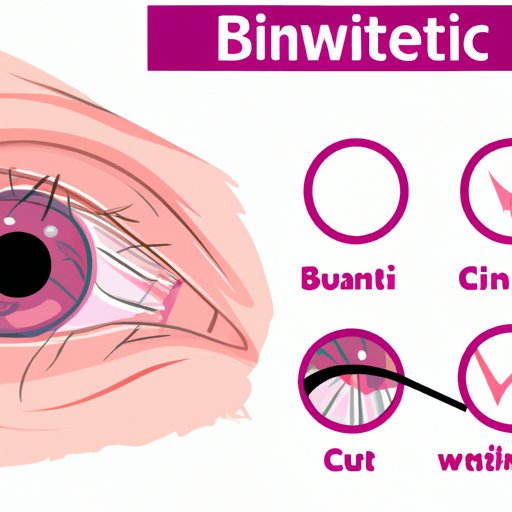Pink Eye: Symptoms, Treatments, and Prevention
Pink eye, or conjunctivitis, is a common condition that can affect people of all ages. This inflammation of the eye’s conjunctiva can cause redness, itching, swelling, and discharge. It can be caused by bacteria, viruses, allergens, or irritants, and can spread easily from person to person. While pink eye is usually not serious, it’s important to recognize its symptoms early and seek treatment to prevent it from spreading and causing further complications. In this article, we’ll discuss the causes, symptoms, treatments, and preventive measures for pink eye.
Understanding Pink Eye
Pink eye is a condition in which the conjunctiva, a thin layer of tissue that covers the white part of the eye and the inner surface of the eyelid, becomes inflamed. This inflammation can be caused by several factors, including:
- Bacterial infections
- Viral infections
- Allergies
- Irritants such as smoke, dust, and certain chemicals
There are three types of pink eye:
- Bacterial conjunctivitis: Caused by bacteria, this type of pink eye can cause a sticky, yellow or greenish-yellow discharge that may crust over the eyelashes during sleep.
- Viral conjunctivitis: Caused by a virus, this type of pink eye can cause watery discharge and is often associated with other symptoms such as cold, flu, or respiratory illness.
- Allergic conjunctivitis: Caused by allergens such as pollen, dust, and pet dander, this type of pink eye can cause itching, swelling, and watery discharge.
The symptoms of pink eye may vary depending on the cause, but can include:
- Redness or pinkish tone of the white of the eye
- Itching or burning sensation in the eye
- Swelling of the eyelids
- Excessive tearing or discharge from the eye
- Sensitivity to light
Treatment Options
If you suspect you have pink eye, it’s important to seek treatment to prevent the condition from getting worse or spreading to others. There are several treatment options available:
Home Remedies for Pink Eye
For mild cases of pink eye, home remedies may be effective in relieving symptoms. These remedies include:
- Applying warm compresses to the affected eye several times a day to reduce swelling and relieve discomfort.
- Using saline solution to rinse the eye and remove discharge.
- Cleaning the eyelids with a warm, damp cloth to remove crusty material.
Over-the-Counter Medications for Pink Eye
Over-the-counter eye drops or ointments can be used to relieve the symptoms of pink eye. These medications may contain antihistamines, decongestants, or anti-inflammatory agents to reduce itching, swelling, and redness. It’s important to follow the instructions on the label and avoid sharing these medications with others.
Prescription Medications for Pink Eye
If home remedies and over-the-counter medications don’t relieve your symptoms, your doctor may prescribe antibiotics or antiviral medications, depending on the cause of your pink eye. It’s important to complete the full course of treatment, even if your symptoms improve before you finish taking the medication.
Preventive Measures for Pink Eye
There are several ways to prevent pink eye from occurring or spreading:
- Practice good personal hygiene, including washing your hands frequently and avoiding touching your eyes with your hands.
- Avoid sharing items that touch the eyes, such as towels, pillows, and eye makeup.
- Reduce exposure to allergens and irritants that can trigger pink eye, such as smoke, dust, pollen, and certain chemicals.
Self-Care Tips for Managing Pink Eye
While treating pink eye, it’s important to take care of yourself to help your body fight off the infection:
- Get enough rest to help your body recover.
- Avoid wearing contact lenses until the condition clears up.
- Take over-the-counter pain relievers, such as acetaminophen or ibuprofen, to relieve discomfort and fever.
When to See a Doctor for Pink Eye
Most cases of pink eye are not serious and go away on their own within a few days or weeks. However, you should seek medical attention if:
- Your symptoms are severe and don’t improve with home remedies or over-the-counter medications.
- You experience changes in your vision.
- You have a weakened immune system or a chronic respiratory disease.
During a doctor’s appointment, your doctor may perform an eye exam, take a sample of discharge from your eye for testing, or prescribe medications to treat the condition. Depending on the cause of your pink eye, your doctor may recommend antiviral or antibiotic medications.
Conclusion
Pink eye is a common condition that can cause discomfort and irritation. Understanding the symptoms, treatments, and preventive measures can help you manage the condition and prevent it from spreading. If you suspect you have pink eye, seek medical attention promptly to prevent further complications. By taking care of your eyes and practicing good hygiene, you can reduce your risk of developing pink eye and protect your eye health.
